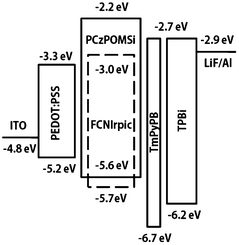
Synthesis of well-defined poly(phenylcarbazole-alt-triphenylphosphine oxide) siloxane as a bipolar host material for solution-processed deep blue phosphorescent devices
Dianming Sun, Qiang Fu, Zhongjie Ren, Huihui Li, Dongge Ma and Shouke Yan
Abstract : Alternating copolymers with both hole and electron transporting side groups as bipolar hosts are of great interest for deep blue phosphorescent devices due to the uniform distribution of electrons and holes within the emitting layer. In this work, we synthesized an efficient alternating copolysiloxane-based host material poly(phenylcarbazole-alt-triphenylphosphineoxide) siloxane (PCzPOMSi) with phenylcarbazole and triphenylphosphine oxide moieties linked to the backbone of polysiloxane. PCzPOMSi exhibits a high decomposition temperature (Td = 437 °C) and glass transition temperature (Tg = 118 °C), and it can form a stable amorphous state. The silicon–oxygen linkage of PCzPOMSi disrupts its conjugation and results in a sufficiently high triplet energy level (ET = 3.0 eV). A bis((3,5-difluoro-4-cyanophenyl)pyridine) iridium picolinate (FCNIrpic)-based device using PCzPOMSi as a host shows a turn-on voltage of 7.7 V, a maximum external quantum efficiency of 4%, and a maximum current efficiency of 8.5 cd A−1. These results demonstrate that a well-designed alternating copolysiloxane-based host is a promising approach to realize high performance solution-processed deep blue PhPLEDs.
